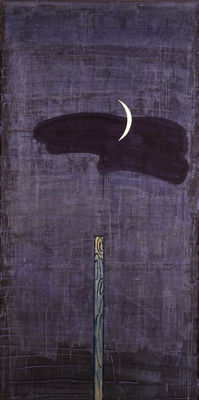Lady of Lullaby
by John W. Sexton
Our eyes are heavy with sleep
The moon falls from its socket
And nothing is ours to keep
Sunbeams burn holes in our pockets
Moonbeams burn holes in our shoes
Stars unscrew from the heavens
And angels are yesterday’s news
So sleep on your pillow of feathers
Fear nothing that falls with the snow
The meadows are white in the moonlight
The night is heavy and slow
A woman steps lightly through starlight
She kisses you now while you sleep
The moon falls from its socket
And nothing is yours to keep
* * *
John W. Sexton lives in the Republic of Ireland and is the author of five poetry collections, the most recent being The Offspring of the Moon, which was published by Salmon Poetry in 2013. He created and wrote the science-fiction comedy-drama, The Ivory Tower, for RTÉ radio, which ran to over one hundred half-hour episodes from 1999 to 2002. Two novels based on the characters from this series have been published by the O’Brien Press: The Johnny Coffin Diaries and Johnny Coffin School-Dazed, which have been translated into both Italian and Serbian. Under the ironic pseudonym of Sex W. Johnston he has recorded an album with legendary Stranglers frontman, Hugh Cornwell, entitled Sons Of Shiva, which has been released on Track Records. He is a past nominee for The Hennessy Literary Award and his poem The Green Owl won the Listowel Poetry Prize 2007. In 2007 he was awarded a Patrick and Katherine Kavanagh Fellowship in Poetry. His poems are widely published and some have appeared in Apex, Dreams & Nightmares, The Edinburgh Review, The Irish Times, The Pedestal Magazine, Rose Red Review, Silver Blade, Star*Line and Strange Horizons.
Where do you get the ideas for your poems?
Children are naturally creative and magical. When you are young, and still have faith in the world of invisible powers, anything is possible, and the most unbelievable events might even be likely. When Hansel and Gretel wandered into the woods, a house baked like a cake and with windows of spun sugar was not in the least unexpected. When the elderly and childless couple found an enormous peach floating down the river, what else would be at its centre but a baby boy? The very common propensity of young children for magic and for entering the domain of the Other was one of the two seeds behind “Lady of Lullaby”. The second seed was the charm that lullabies have cast upon me from childhood. The power of the lullaby cannot be underestimated and originates from practical magic. These beautiful little chants were used from the earliest of times not simply to make children safe in their beds, but more importantly, to convince children that they were safe from every danger that lurked in the night before one wakes. In that way they operated essentially as prayer. As a poetic device lullaby is not as popular as it once was, but many poets still utilize its power, most recently the late Leonard Cohen, and from the middle of the last century the poets James Agee, W. H. Auden and Sylvia Plath, amongst others. As a poet, company such as theirs is what I aspire to, no matter how hopeless that aspiration may be for me.






0 comments:
Post a Comment